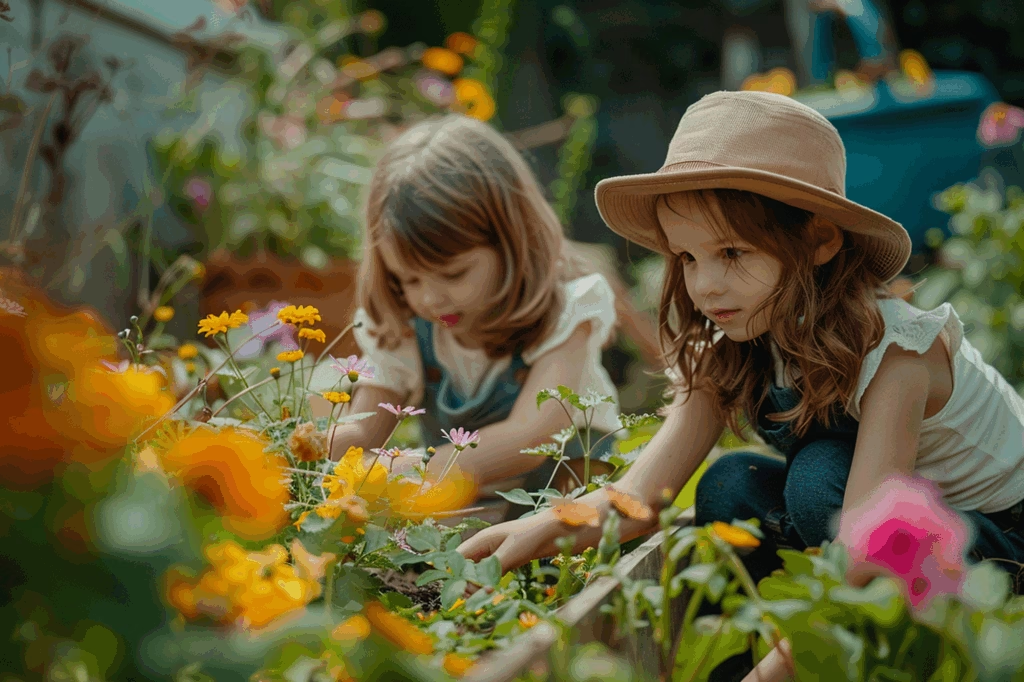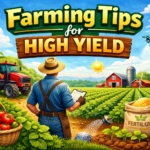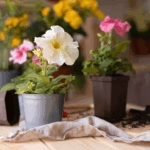Introduction
Gardening isn’t just for adults—kids can benefit immensely from growing plants. It teaches responsibility, encourages outdoor activity, and introduces them to science and ecology in a fun, hands-on way. Whether you have a backyard, balcony, or just a few pots, there are plenty of gardening ideas for kids that are both educational and entertaining.

This guide covers creative projects, easy plants to grow, and tips to make gardening enjoyable for children of all ages.
Why Gardening Is Great for Kids
- Educational: Teaches biology, ecology, and life cycles.
- Healthy Habits: Encourages physical activity and healthy eating.
- Responsibility: Kids learn to care for living things.
- Creativity: Decorating pots, creating plant markers, and designing garden layouts fosters imagination.
According to a study by the American Horticultural Society, children who garden show improved focus, emotional development, and a greater appreciation for nature.
Easy Plants Kids Can Grow
Choosing plants that grow quickly and are easy to care for keeps kids motivated.
1. Fast-Growing Vegetables
- Radishes
- Lettuce
- Spinach
- Green beans
2. Herbs
- Basil
- Mint
- Chives
- Parsley
3. Flowers
- Marigolds
- Sunflowers
- Zinnias
- Nasturtiums
Tip: Pick brightly colored or fragrant plants—they’re more exciting for kids to observe and harvest.
1. DIY Container Gardening
Kids love having their own garden space, even if it’s just a pot.
Ideas:
- Paint old pots with fun designs.
- Use plastic bottles or cups to grow seedlings.
- Label plants with homemade plant markers made from popsicle sticks or stones.
Container gardening is ideal for indoor or small-space gardening.
2. Create a Mini Vegetable Patch
If you have a backyard, dedicate a small section for kids.
Steps:
- Let them pick what to plant.
- Teach them how to prepare the soil and plant seeds.
- Encourage watering and weeding regularly.
This hands-on approach makes gardening tangible and rewarding.
3. Fun Themed Gardens
Kids love themes—they make gardening imaginative.
- Butterfly Garden: Plant flowers that attract butterflies, like zinnias or milkweed.
- Fairy Garden: Tiny plants, pebbles, and miniature decorations create a magical world.
- Pizza Garden: Grow basil, tomatoes, peppers, and oregano for a fun cooking project.
4. Composting for Kids
Introduce kids to composting as a way to recycle kitchen scraps.
- Show them how to layer fruit and vegetable scraps with leaves.
- Teach them about decomposition and soil health.
- Use finished compost to enrich their garden plot.
This teaches sustainability while keeping kids engaged.
5. Gardening Crafts
Combine creativity with gardening through crafts:
- Painted Rocks as Plant Markers
- DIY Garden Signs with sticks and cardboard
- Bottle Cap Seed Starters for tiny seedlings
- Leaf Prints and nature collages for art projects
6. Sensory Gardens
Sensory gardens stimulate all five senses—perfect for younger children.
- Sight: Bright flowers like marigolds or sunflowers.
- Touch: Soft plants like lamb’s ear.
- Smell: Herbs like basil and mint.
- Taste: Cherry tomatoes or strawberries.
- Sound: Wind chimes or rustling plants.
This approach makes gardening a multi-sensory experience.
7. Educational Gardening Activities
- Science Experiments: Track seed germination rates or test different soils.
- Plant Journals: Encourage kids to record growth, weather, and observations.
- Bug Hunt: Explore garden insects and learn which are helpful or harmful.
- Math Skills: Measure plant growth or count seeds.
Safety Tips for Kids in the Garden
- Use child-safe, non-toxic tools.
- Avoid chemicals or synthetic fertilizers.
- Teach proper handwashing after gardening.
- Use sunscreen, hats, and gloves when outdoors.
Quick Reference: Gardening Ideas for Kids
| Activity | What Kids Learn |
|---|---|
| DIY Container Gardening | Plant care & creativity |
| Mini Vegetable Patch | Responsibility & nutrition |
| Themed Gardens | Imagination & planning |
| Composting | Sustainability & ecology |
| Gardening Crafts | Creativity & fine motor skills |
| Sensory Garden | Multisensory exploration |
| Educational Activities | Science & math |
FAQs
Q1: What is the easiest plant for kids to grow?
Radishes and sunflowers are fast-growing and visually rewarding.
Q2: How can I keep kids interested in gardening?
Let them choose plants, involve them in crafts, and celebrate harvests.
Q3: Can kids compost indoors?
Yes, small worm bins or kitchen compost containers work well.
Q4: How often should kids water their plants?
Daily for potted plants; every 2–3 days for garden beds depending on weather.
Conclusion
Gardening is a wonderful way to teach children responsibility, science, and creativity while letting them enjoy the outdoors. From DIY container projects to themed gardens, gardening ideas for kids are limitless.
Start small, make it fun, and let your children take pride in growing their own plants.
Call to Action: Explore more kid-friendly gardening tips, DIY projects, and seasonal guides at Agzora.com to make gardening exciting for the whole family.





